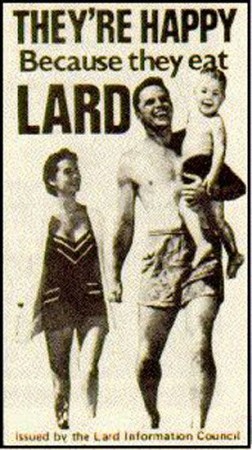Sunflowers originated in the Americas, but for a long time, especially in the 1800’s, has been planted and used a lot more in Eurasia. Today, a lot more is being produced in the U.S., because the potato chip industry prefers sunflower oil to the partially hydrogenated oils that their customers believe are healthier. Dan Charles’ story on NPR traces some of this history.
Tag: audio
Teaching Your Kids how to Argue
All that arguing with your teenager is, basically, teaching them how to argue. You yell, they learn to yell. You listen, and make your rational arguments respectfully, and they learn to do the same — both with you and with others; so much so that it inoculates against peer-pressure.
Patti Neighmond has a nice story about the benefits of parent-teenager arguments, on NPR’s All Things Considered. One particularly interesting is that adolescents who learn to argue well are much less susceptible to peer-pressure.
Facing the Advertising Noise

We face a lot of advertising. All the time. According to Martin Lindstrom, the author of Brandwashed, “the average American 3-year-old can recognize 100 brands” (NPR Staff, 2011). I usually discuss advertising at the same time as we’re talking about propaganda.
Guy Raz has an excellent interview with Lindstrom on All Things Considered.
Learning from Multiple Perspectives Works Better
In fact scientists have found that variety boosts both attention and retention.
–Patti Neighmond on NPR’s Morning Edition (2011): Think You’re An Auditory Or Visual Learner? Scientists Say It’s Unlikely
Morning Edition has an excellent piece that points out that there is little or no actual experimental data supporting the idea that teaching should be individually tailored for different learning styles.
So presenting primarily visual information for visual learners has no proven benefit.
This is something we’ve seen before, however, this article points out that providing each student with the same information in different ways makes it much more interesting for them, increasing their motivation to learn and their retention of what was taught.
Which is fortunate because it means that if you were trying to teach in multiple ways, hoping that the more vocal stuff benefits the auditory learners and the pretty diagrams resonate more with the visual learners, even if this principle is all wrong, all of your students would still have gotten the benefits of variety.
Another key point is that:
Recent studies find our brains retain information better when we spread learning over a period of time versus cramming it into a few days or weeks.
–Patti Neighmond on NPR’s Morning Edition (2011): Think You’re An Auditory Or Visual Learner? Scientists Say It’s Unlikely
So the educational psychologist, Doug Rohrer, recommends giving less math problems at a time but spreading the work out over a longer time. Our block schedule, with three weeks on and three weeks off, ought to work well for this, since students will be studying math intensely on the on-blocks and doing revision assignments on the off-blocks.
The article is below:
There’s no Sound in Space, Except …
Except that you can hear the dust and small rocks banging on your spacecraft.
from JPL.
Tunisian revolution
NPR had a great article today summarizing what’s been going on in Tunisia.
I played the article this morning. We had a little discussion about the conflicting groups in Tunisia and the possible causes of the revolution. It would be nice to be able to follow the emergence of a democracy in real-time.

Music in the morning
We did poetry in the mornings last year at the end of our community meetings as a substitute for musical appreciation. However, the inestimable Anna Clarke, sent me the link to NPR’s 100 most important American musical works of the 20th century. The 8-13 minute long pieces include excerpts of the music, an interview with someone connected to the music and commentary by the NPR reporter. First on the list is ‘Adagio for Strings’ by Samuel Barber.
I’ve also caught their series on 50 great voices which is a great place to discover some truly iconic voices from around the world that I did not even know about.
Stories on Stage: Audio of short stories online
Chicago Public Radio has its series of short stories read by actors, Stories on Stage, available online. It’s quite an impressive list of stories and includes some of Camella C.’s favorites:
- “Eleven” by Sandra Cisneros, and
- “The Kids’ Guide to Divorce” by Lorrie Moore
The series does not seem to extend beyond 2007 but there are quite a number of stories going all the way back to 2001. It’s great to hear these stories well read, and to recognize that the rules for reading prose out loud are very similar to those for poetry.
Hat tip to Anna C. for pointing this out to me.